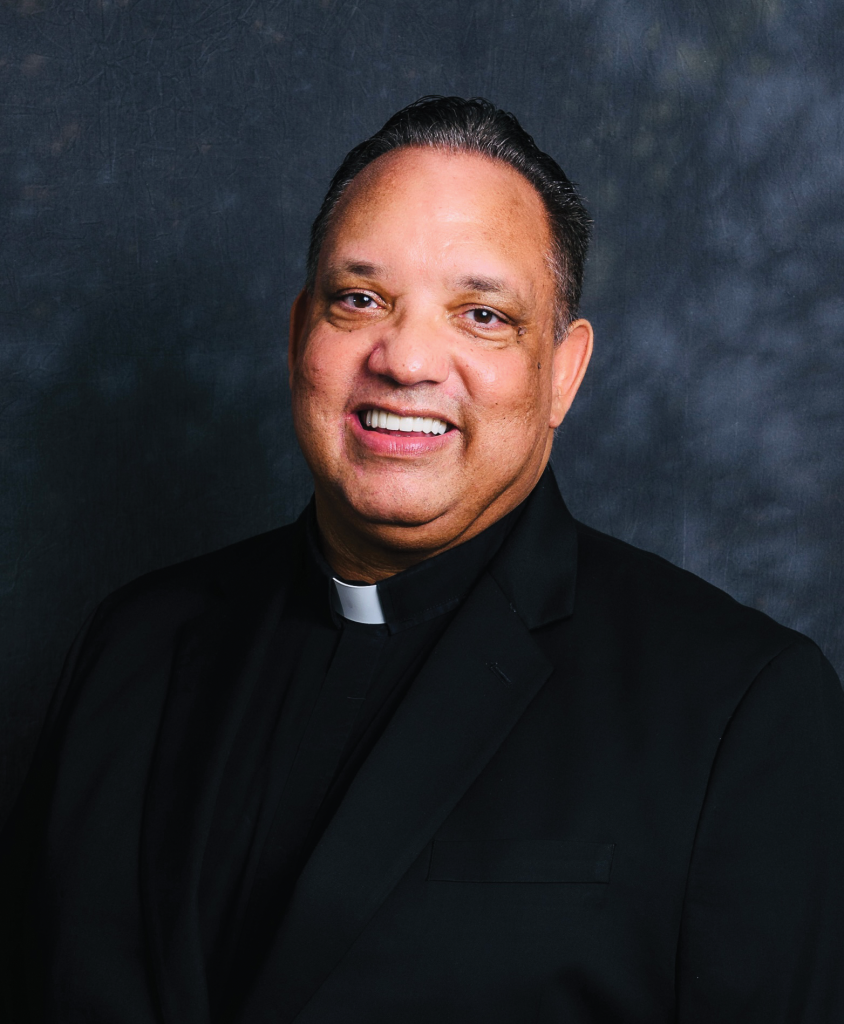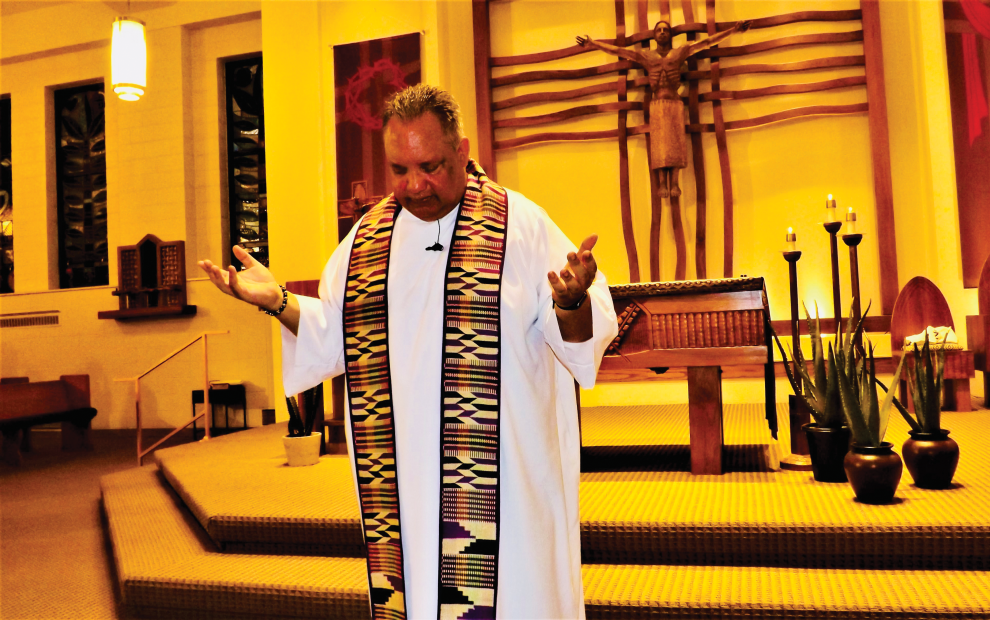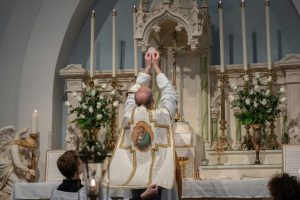
There is no comprehensive Catholic theology of preaching, says Father Maurice Nutt, a professor of preaching at Aquinas Institute of Theology and the author of multiple books, including Down Deep in My Soul: An African American Catholic Theology of Preaching (Orbis Books). “The best we have is the Vatican II document Verbum Dei, which talks about the revelation of the word of God,” Nutt says. “Most seminaries or schools of theology use only one or two sources when teaching preaching, and that is typically written by a white person. So my book is an attempt, from a cultural perspective, to write a book that will meet the needs not only of Black Catholics, but of the Catholic Church as a whole, especially in the United States.”
In Deep Down in My Soul, Nutt explores preaching in the Black Catholic tradition, including its connections to African American spirituality, what a Black sermon looks like, and the connection between preaching and evangelization. He argues that learning about Black preaching isn’t important just for Black pastors or those serving predominantly Black parishes; Black preaching can serve anyone seeking to witness to the prophetic nature of their relationship with God. Indeed, every Catholic—lay or ordained, Black or white—is called to preach, or to share the Good News of our liberating faith. God calls us to act for justice, says Nutt, and every homily, every witness, should stand testament to that.
What is preaching?
Preaching is a way of demonstrating your spiritual relationship with God. We think of preaching as a Sunday homily during which the preacher expounds upon or exegetes the scriptural text or applies it to peoples’ lives, but I find that preaching also speaks so much about how the preacher connects with God and who God is for them. In its most pure form, preaching derives from one’s baptism and one’s relationship with Jesus Christ. It conveys the sense that “I am called to witness in my life. Somehow my life has changed, and I’m a living witness to that.”
All Christians who are baptized are called to witness to their relationship with Jesus. Pope Francis talks about Catholics witnessing to their relationship with Christ, the church, the body of Christ, and one another. In the purest form, this is preaching.
We do not properly represent preaching when we only think of liturgical preaching, where only a priest or deacon can preach. Preaching, in its broadest sense, encompasses the whole body of Christ witnessing to their love of Jesus Christ and their commitment to following the Christian way of life.
Does the Catholic Church consistently promote this definition of preaching?
Before I answer that directly, let me say something about the church’s role in preaching in general. Most seminaries only offer one preaching course for those who become ordained and receive faculties to preach. We have double or triple the number of courses in scripture and theology, but when it comes to the practicality of how one expresses their faith, seminarians only have to take one course. I think it’s a shame that more emphasis is not placed on liturgical preaching within our seminaries.
To speak to your question, no, I do not feel that the church emphasizes the broader sense of preaching. Or, to give it a different title, the ministry of Good News. As baptized Christians, we all have a commitment to the ministry of Good News: to share through our faith life, devotional life, and commitment to works of justice what our Christian identity calls us to do. My faith calls me to witness, to live a certain way. It causes me to invite others to know Christ, and it calls me to a place of conversion in my own life.
I do think Pope Francis encourages preaching in this broader sense. He speaks of the word encounter. Well, in my estimation, an encounter is an experience of preaching. People share their faith, their witness; people are in the midst of some action that touches someone deeply and makes them want to know, love, and serve God more intimately.
Pope Francis is calling people to be greater witnesses. I love what he says in one of his talks: “When one leaves Mass, they should not look like they just left a funeral.” We are supposed to experience the joy of the gospel at Mass. The priest shouldn’t just preach at or to you but should enable you to preach for yourself and bear witness to others.
What makes a good homily?
A good homily is biblically based and theologically sound. It has to be culturally and socially relevant, and it must bring people to celebrate the Good News of the gospel. A homily is supposed to inform. In my book Down Deep in My Soul, I write that a homily should “tell me something I’ve never heard before.” I expect a preacher to go behind the text, to dig deep within scripture and illuminate something I’ve never heard before. I want to be informed.
Second, I want to be inspired when I hear a homily. Inspiration means I want to experience the Good News of the gospel. Third, I want to be motivated. After hearing one of their homilies, I often ask my students, “Well, so what?” That’s a jolting response from a teacher. But I think a homily should motivate you to think, feel, and do something differently than what you’re doing right now. A sermon should tell you what to experience, what to feel, what to try to do in your Christian life.
Last is celebration. In the Catholic Church, whenever we hear the word celebration we think of celebration of the Eucharist. But there are actually two celebrations going on in the liturgy at the same time: the celebration of the Word and the celebration of the Eucharist. Preaching is sharing the word of God and celebrating that we have received good news, hope, the word that’s going to get us through the week. We’ve received something that we can share with others.
In the Black preaching style, celebration is clearly seen in the way in which we end a homily. It ends with this verbose, boisterous celebration of God’s word: You can see the proclamation going higher and people rejoicing. It’s a literal celebration that leads us to the altar of Christ to celebrate the sacrifice and resurrection that comes from the Eucharist and the fact that we have new life. In eating the body and drinking the blood of Christ, we celebrate that we have eternal life.
How does one go about writing a homily that accomplishes all this?
When I’m writing a homily, first of all I pray over the text. It’s important to me to spend time in prayer. I allow the text to speak to me. Then I have a conversation with the text. I ask it questions: “Who is this written to? What was the historical and cultural situation?” I begin to pay attention to all that.
Then I go to different sources, such as biblical commentaries, that will give me some idea as to why the text was written. I also look at what’s happening in my local community—what’s important to people and what may be challenging to them. That helps me derive what life applications could come out of this preaching.
I also ask myself, “What is the story of my community? What are their cultural stories? What’s significant about their parish story? What’s going on in the greater world?” I use all of this to build a story or find anecdotes to share. Finally, I ask in every single homily that I write, “What is God saying to God’s people right now in this specific time and space that will give the people of God a sense of hope and encouragement to remain firm in their faith and dedication to witnessing? How can they be even more committed to sharing the Good News of Jesus Christ with others?”
This process normally takes a full week. In my book I set out a six-stage schema I use and find helpful to formulating a solid homily for any Sunday morning.
What might it look like to do this reflection on, for example, some of the readings for Christmas or Advent?
The Advent and Christmas season is one of hope, anticipation, and expectancy. If I were to formulate a homily or sermon around that season, I would focus on the fact that Christ is the Prince of Peace. We’re preparing for him to come into our lives, to bring peace to a war-torn world, a world where racism and sexism and homophobia continue to rear their ugly heads. This Prince of Peace will bring peace to all those various oppressions that happen in our world.
It is also a season of liberation. Those who have been walking in darkness have now seen a marvelous light, and this light, who is the Christ, brings hope, justice, and peace to those who have not known of God’s goodness and love. That love is now present among us. I believe the whole church for that reason alone should say, “Amen.”
What does it mean to preach racial justice?
Whenever we talk about race, people immediately say, “You’re preaching politics.” But when we’re preaching racial justice, it’s not about politics; we’re preaching love, compassion, and dignity for all people—all virtues that our Catholic Church teaches. People are comfortable preaching against abortion, but what happens after a baby is born? Liberation preaching, racial justice preaching, is, in essence, pro-life preaching.
Preaching racial justice is understanding that every human being is created in the image and likeness of God. God is a reflection of who you are and how God created you to be. I believe that God wants and demands justice for all of God’s creation. God demands that all of God’s creation is shown respect and dignity as the unconditionally loved creation of the universal God. From that perspective, when you understand that God sees equality, equity, and liberation for all God’s children, then you know that preaching literally leads you to celebration. I am fearfully and wonderfully made, because I’m made in the image and likeness of God. In other words, preaching racial justice is literally preaching who God is. God is a God of justice for all God’s people.
On the practical side, it’s fair to say that racial justice preaching is not executed, implemented, or proclaimed a lot in the pulpits of our Roman Catholic churches. We tend to avoid preaching about racial justice or other social justice issues. We are so concerned about who will be offended, what people will think, and, most importantly, whether people will withdraw their financial contributions that we fail to embody what our prophetic God calls for preaching to be, which is prophetic in nature.
What would it look like for the church to make anti-racism a pro-life priority and really embrace the prophetic call to preach racial justice?
Well, the church would be full. We would not have empty pews. People would feel seen, heard, and respected. If the Catholic Church put as much emphasis on anti-racism as antiabortion, then it would give a dignity to all God’s children. It is a life issue: Brown and Black people are literally being killed. It happens day in and day out, these seemingly senseless killings that seem of no regard to the majority of society.
We need the church’s help. We need them to help our young people have respect for their own lives. But when a young person has been devalued and oppressed, when they have suffered substandard housing and a lack of employment and have been relegated to poverty so that they feel like, “Well, no one cares about my life, so why should I care for others?” That message comes from greater society. It comes from the church.
It would be a wonderful thing for the Catholic Church to put anti-racism preaching on an equal footing with anti-abortion preaching. I think we would have a different world, a different society. I’m hopeful: I won’t say it can’t happen. I believe that I may not see it in my lifetime, but I pray one day that the church will be in that space. I pray that will happen at the synod, that racism will be addressed from a universal perspective and that the church will begin to do more to love all her children.
What happens when we fail to do this?
I write in my book about an African American woman who went to Mass the Sunday after George Zimmerman was acquitted for Trayvon Martin’s murder, hoping to hear some word of comfort or liberation. But her pastor didn’t mention it at all. She went up to him afterwards and told him, “It’s a damn shame, Father. That was a damn shame.”
I attended Mass at the same parish. I knew the priest well. I don’t think that, even as a Black man, he was aware of the hurt and pain that was in the pews. He had probably written his homily way in advance, before the verdict.
But that brings me to a deeper point: Whatever is happening in society and whatever affects that community must be addressed, even if it’s at the 11th hour. A preacher must be ready to pivot to address the urgent current needs of their community. You can’t be ensconced in the idea that “this is my manuscript. I have written it. I am committed to it.” We have to be ready to change at a moment’s notice, to say, “Thus says the Lord.” We have to address these things.
In that particular instance, God had almost providentially set it up. The gospel reading was the story of the Good Samaritan, a story that asks, “Who is my neighbor?” And here you have a neighborhood watchman who kills an unarmed young boy holding only some iced tea and some Skittles. And yet this man felt that his life was threatened and he had to defend himself. As a preacher, I was frustrated that day that I was just attending Mass. I would have had something to say.
Our world is fraught with insecurities. We need a word of healing. And then we ask ourselves, “Why are there so few African American Catholics? Why is there an exodus of African American and even Latino/a people from the church? It’s because we feel that the church in America caters to a European or white sensibility and not to what is happening to us. Our concerns, our struggles, our dealings with oppression are not worth proclaiming as evil, as racist, from the pulpit. Therefore, we have to ask ourselves: “Is this truly my church? Does the church love me? Do I belong to the church? If so, does the church see me? Can it proclaim words that are good news to my soul?” I often find that the answer is no, we don’t receive that.
What would you say to someone who was worried about preaching racial justice for fear of offending people in the pews?
Anyone who feels this way needs to get a new vocation. If you say, “I’m only preaching at the whims of people’s opinions or what they think of me,” or, “I only preach to be liked,” then you’re not in the right vocation.
Preaching sometimes means you’re going to comfort the oppressed and discomfort the oppressor. There’s a thin line a preacher walks in that they have to both encourage those who are oppressed and challenge the oppressor. There’s this duality, and it isn’t easy to do both of these things at the same time.
I know some people say, “I don’t preach on social justice issues because of what people will do or say or think.” It’s a shame that, if you are a preacher responsible for proclaiming the Good News, you feel that somehow you have to acquiesce to the whims of the people rather than to the one whom you represent in the pulpit, our loving and saving God.
I challenge pastors who are not being prophetic in the pulpit to ask themselves two questions: “Why am failing to do this?” And, “What will it take for me to become a prophetic preacher?” Pastors have to be willing to answer, “This is my identification with Jesus Christ, the one who suffered yet liberated.” If we want to identify with the one whom we’re called to exemplify and to emulate in the pulpit, we have to be willing to do what he did. He challenged the powers of his day. He was very radical in talking about being just but was also concerned about the practical everyday needs of God’s people.
In your books you write that Black preaching can overcome the polarization we see today within the Catholic Church. Can you speak more on this?
The gift of Blackness is a gift to the universal church. Think of a people who have been oppressed and maligned, and yet they still have joy, they still have hope. And their hope is not based on who’s in the White House, in the Senate, or in Congress. Their hope is in a God who continues to speak liberation to the oppressed.
If you find good Black preaching going on in a Protestant or even a Catholic church, look in to that congregation; it will no longer be segregated. I believe that our European and our Latino/a brothers and sisters are looking for that spirit. They’re looking for that joy and for that hope, and so they go to predominantly Black parishes because there’s celebration there. You see it in the robe-clad gospel choir. You see it in the community where you are warmly welcomed when you enter. People don’t look at you like you don’t belong. They’ll reach out and, if you’re not careful, they might even hug you.
There’s a sense of joy in Black churches—in the preaching, the singing, the celebration, and the fellowship—because we’re gathered in communion to celebrate the goodness of God in our midst. All of this is going on at once, and for those who want to come closer to Christ, it draws them in to the sense of community. So I feel that the Black church is a gift to the universal church in that Black preaching informs, celebrates, and proclaims the Good News.
When the U.S. Conference of Catholic bishops wrote “Fulfilled in Your Hearing,” their 1982 document on the homily and Sunday assembly, everything they said about what made a good homily can be found in the Black preaching style. I say unequivocally, boldly, that Black preaching answers the question of good preaching for the U.S. bishops and for the U.S. Catholic Church.
This article also appears in the December 2023 issue of U.S. Catholic (Vol. 88, No. 12, pages 26-31). Click here to subscribe to the magazine.
Images: Courtesy of Father Maurice Nutt, C.Ss.R.














Add comment